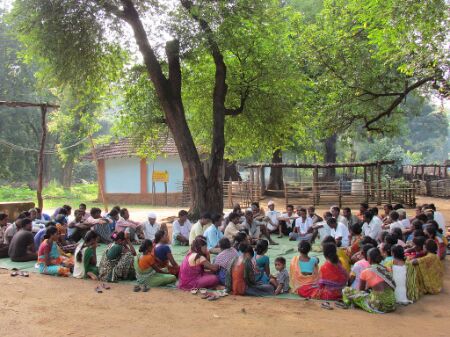A paradigm shift
Kulimathur Gram Panchayat development plan offers a logical framework to enhance people’s participation in governance and can be replicated to other areas as well

Recently, I got a chance to go through the Gram Panchayat Development Plan prepared by Kulimathur Gram Panchayat in Thiruvaiyaru Block, Thanjavur District. It was prepared with the support of a local civil society organization and was facilitated by a Chennai-based research organization specializing in local democracy. The plan is a 235-page elaborate document containing a detailed analysis of local socio-economic conditions, based on primary data collected from households and panchayats, along with secondary data drawn from various agencies. It had been a painstaking effort on the part of panchayats and facilitating organizations to come out with a realistic plan that can be emulated by other panchayats in Tamil Nadu and other states. The plan, approved by the Gram Sabha, is now a legal document to be implemented by the panchayat and the Government. It has legal effect in the sense that any decision taken by the Gram Sabha is finalized for operation, if it is taken within the powers conferred to Gram Sabha under state laws, as per the Supreme Court verdict in a case filed by a Gram Panchayat in Goa against a private company. While going through the plan document, one can infer that the gram panchayats and the facilitating agencies have followed the detailed guidelines issued by the Government of India. The five-year plan is to be implemented from 2021 to 2026. From the development perspective in villages, the document is significant to achieving economic development and social justice. For 25 years, it had been only a ritual rather than being a rational practice. However, the 14th and 15th Union Finance Commissions reiterated that constitutionally mandated practices have to be followed to receive grants from the Union Government. To comply with the stipulations, panchayats had only prepared a compliance list including mostly the construction works involving cement soil, while ignoring the demands of the people. If a strategic document comes out of the collective vision of all sections of the rural community, it will alter the paradigm of development work from supply- to demand-driven aspects, which means the government departments will be obliged to work on the needs of the people, mentioned in the plan document. The Kulimathur Gram Panchayat participatory development plan is an eye-opener for many to bring a new culture of preparing a participatory development plan in every gram panchayat in Tamil Nadu. It requires a change in the mindset of the officials — not only in the rural development department but in all the line departments. Convergence, synergy and coordination are the words, but in reality, all are happy working in silos. The plan document has nicely integrated the demands of the people with the government schemes. The gaps have been identified, and ways and means have been found out to fill the same. It gives a sense that line departments cannot operate their schemes without referring to the new plan document. If the line departments start working as per the development plan prepared by the people through the panchayat, the officials' hold over people will be reduced drastically, and their administrative empire will lose its charm as people will be empowered in the process.
It is also a truism that while power is transferred, the groups, individuals or institutions that are losing powers will make an appropriate design to keep the powers with them. This, we have seen while seats are being reserved for women and Dalits. The male members of the family immediately convince female members to contest elections if the constituency is reserved for women. In the same way, the dominant castes nominate their farmworkers or servants to contest elections. To overcome the design issue, a prolonged struggle has to be made. In the same way, the officials keep the elected representatives under their fold, as many do not have leadership skills and capacity. If all gram panchayats in Tamil Nadu prepare a plan like this, the whole supply-driven and scheme-driven development activities will be changed. The new DMK government has committed itself to this task. But the problem is the non-availability of professionals to carry out the exercise systematically with the participation of people. In India, we are not conscious that rural development activities need professionals to do the job. There is a way out now, as some higher learning institutions in India have mandated rural service as part of their academic activities under Unnatha Bharat Abhiyan 2.0, and the same can be used for the preparation of prospective development plans. If it is done in entire Tamil Nadu, a new development paradigm will emerge, and thereby, Tamil Nadu can show the path to other states as well.
The writer is a former Professor and Rajiv Gandhi Chair for Panchayati Raj Studies, Gandhigram Rural Institute. Views expressed are personal



